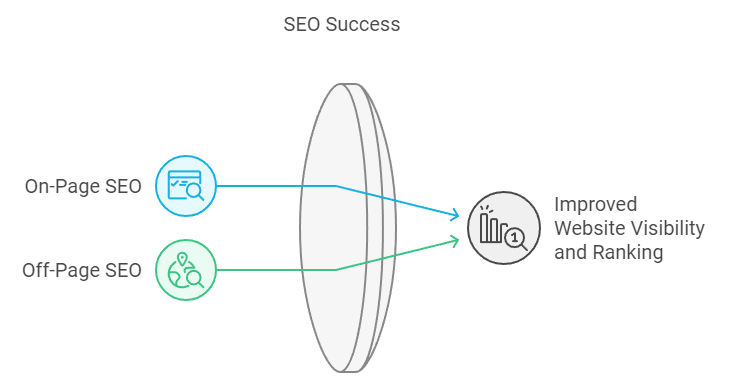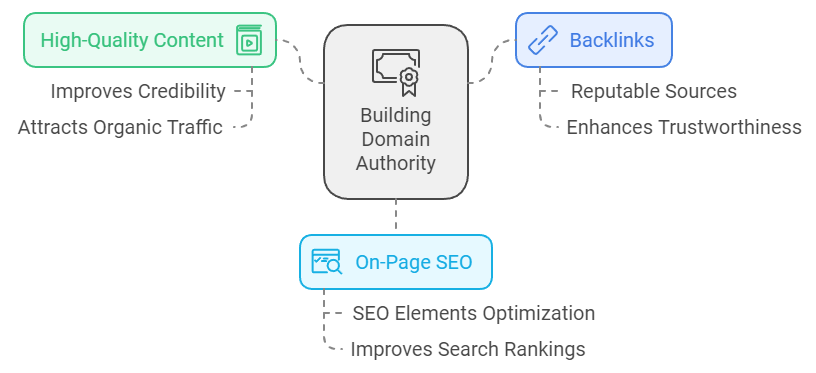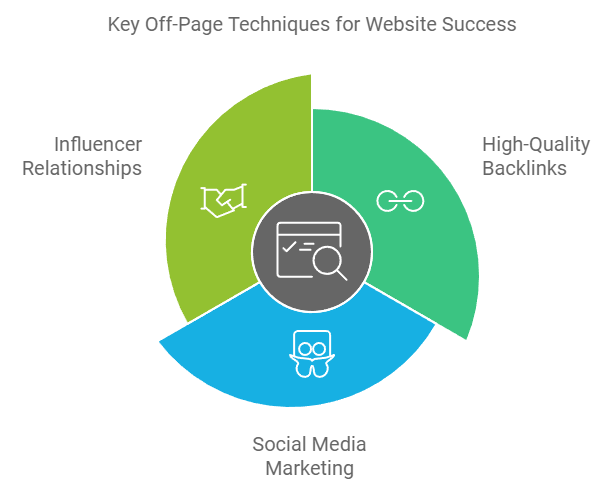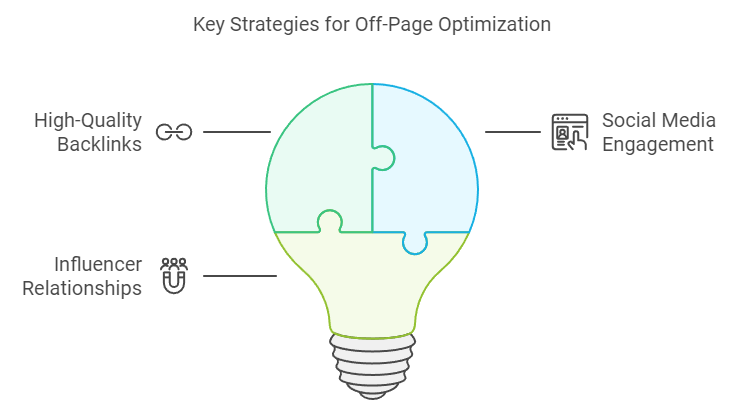Understanding Off-Page SEO
As I delve into off-page SEO optimization, I recognize that understanding its components is vital for anyone looking to boost their site’s performance and visibility in search engines.

Importance of Off-Page Strategies
Off-page SEO plays a significant role in determining how well a site ranks. It is essential for search engines to view a website as reputable and authoritative. Techniques like backlinking, garnering reviews, and obtaining recommendations are key contributors to establishing this reputation, which in turn enhances visibility in search results (Source).
Additionally, engaging in off-page SEO impacts the position held on search engine results pages (SERPs), leading to greater exposure for businesses. This results in more organic traffic to the website, reinforces expertise, establishes brand awareness, and ultimately contributes to enhancing domain authority. Together, these factors improve search engine ranking.
| Off-Page SEO Benefits | Description |
|---|---|
| Improved Rankings | Enhanced visibility in search results. |
| Increased Traffic | More organic visitors to the website. |
| Brand Authority | Establishing a trustworthy online presence. |
| Expertise Recognition | Recognition as an authority in the field. |
To learn more about specific techniques, you can check out my guide on off-page seo techniques.
Relationship Between On-Page and Off-Page SEO

Both on-page and off-page SEO are critical for improving a website’s ranking. They complement each other in various ways. While on-page SEO focuses on optimizing content and elements within the website to help search engines understand the offerings, off-page SEO signals that the website is authoritative and trustworthy.
Building a strong foundation with on-page strategies allows for more effective off-page efforts. For example, having quality content can lead to more backlinks, while effective off-page optimization can boost a site’s authority, making it easier for on-page strategies to succeed in the long term (Web.com).
Understanding this relationship helps me sharpen my approach, ensuring I’m employing both strategies for holistic optimization. If you’re interested in tools that can aid in this process, check out my list of off-page seo tools for more information.
Employing a balanced strategy of both on-page and off-page techniques is essential for success in SEO. By focusing on optimizing both aspects, I can contribute to long-term SEO success and improved site performance.
Building Domain Authority

Creating a strong online presence is essential for success, and a key part of that is building domain authority. This involves various strategies, with backlinks being one of the most crucial elements.
Significance of Backlinks
Backlinks are a fundamental piece of off-page SEO optimization. They serve as endorsements from other websites, helping to establish the authority and trustworthiness of my site in the eyes of search engines. When reputable sites link to mine, it passes “link juice,” which boosts my domain’s perceived authority (WooRank). This is important because search engines like Google use backlinks as a key ranking factor. According to Semrush’s 2024 Ranking Factors study, domain authority is one of the strongest predictors of a webpage’s ranking position, ranking sixth overall.
| Metric | Importance Level |
|---|---|
| Domain Authority Score | 6th |
| Trust Flow | Strong Indicator |
| Referring Domains | Essential |
| Backlink Score | Crucial |
This table summarizes some of the essential off-page SEO metrics that directly influence my website’s ranking.
Quality vs. Quantity in Link Building
When focusing on backlinks, it’s essential to understand that quality often trumps quantity. Not all backlinks are created equal. High-quality backlinks from authoritative sites carry more weight compared to numerous low-quality links. Having links from high-authority domains helps search engines see my website as more relevant and trustworthy (Mailchimp).
Here’s a simple breakdown:
| Type of Backlink | Description | Impact Level |
|---|---|---|
| High-Quality | Links from established, authoritative sites | High |
| Low-Quality | Links from irrelevant or spammy sites | Low |
| DoFollow Links | Pass SEO authority to my site | High |
| NoFollow Links | Do not pass authority, often used in comments | Low |
To effectively improve my domain authority, I should aim for a strategic mix of backlinks that emphasize quality over sheer numbers. Engaging in an effective off-page SEO strategy can help achieve this balance. Additionally, using off-page SEO tools can assist in analyzing the quality of my backlinks and overall strategy.
Effective Off-Page Techniques

Off-page SEO optimization plays a crucial role in enhancing the overall visibility of a website. Below, I will delve into two effective techniques that can significantly boost the authority of your site: content marketing for backlink acquisition and local SEO optimization.
Content Marketing for Backlink Acquisition
Content marketing is key for building valuable backlinks, which are essential for off-page SEO. Backlinks not only enhance site authority but also pass “link juice,” making your site appear more trustworthy to search engines. By distributing high-quality content across various channels, I can improve my site’s credibility as well as its Experience, Expertise, Authoritativeness, and Trustworthiness (E-A-T) (Source).
When I create engaging articles, infographics, or videos, I increase the chances of media attention. This, in turn, can lead to natural backlinks as other sites and blogs reference my content. The following table outlines some effective content marketing strategies to acquire backlinks:
| Strategy | Description |
|---|---|
| Blog Posts | Writing informative articles to attract links |
| Infographics | Creating visually appealing graphics that can be shared |
| Videos | Producing engaging video content to encourage shares |
| E-books | Offering in-depth guides that others will cite |
Additionally, unlinked mentions of my website in online content can still bolster my authority. These mentions can be converted into backlinks by reaching out to the authors (WooRank).
Local SEO Optimization
Local SEO optimization is vital for increasing traffic and brand awareness in specific geographical areas. For businesses with physical locations, implementing effective local SEO strategies can elevate their rankings in local search results. Some essential actions include managing the Google Business Profile and ensuring consistency in NAP (Name, Address, Phone number) citations across various online platforms (Source).
To illustrate the impact of local SEO on search visibility, here are some actionable steps that can be taken:
| Strategy | Description |
|---|---|
| Google Business Profile | Claiming and optimizing the Google Business Profile |
| Local Listings | Ensuring NAP consistency across directories |
| Customer Reviews | Encouraging satisfied customers to leave positive reviews |
By emphasizing local SEO, I can effectively boost my website’s visibility in local search results, allowing me to reach customers in my area more efficiently. These techniques, combined with a solid understanding of off-page SEO, can drive significant results in improving my digital presence. For further techniques on this topic, I recommend exploring our full list of off-page SEO strategies and off-page SEO activities.
Enhancing Off-Page Performance

To improve my website’s visibility and search engine rankings through off-page SEO optimization, I focus on two key strategies: social media engagement and guest blogging alongside influencer outreach. These methods can significantly boost my online presence and drive more traffic.
Social Media Engagement
Social media engagement is a friendly way to enhance my off-page SEO efforts. By interacting with my audience on platforms like Facebook, Twitter, and Instagram, I can encourage followers to share my content, leading to increased visibility. When more people share my posts, I get additional backlinks and traffic to my website, which directly benefits my SEO.
Utilizing social bookmarking sites is another effective tactic to build backlinks. These platforms help increase website traffic and enhance search engine rankings by allowing me to share my content with a wider audience. Here’s how social media engagement can impact my site:
| Benefit | Outcome |
|---|---|
| Increased Traffic | Higher site visits from shares |
| Enhanced Brand Awareness | More people recognize my brand |
| Backlink Opportunities | Links from shared content |
| Improved Search Rankings | Better visibility on search engines |
Guest Blogging and Influencer Outreach
Guest blogging is an excellent way to reach new audiences while improving my off-page SEO. By writing for reputable websites, I can share my expertise and gain backlinks to my site. Not only does this help in building domain authority, but it also boosts brand awareness and drives referral traffic (Mailchimp).

Influencer outreach is another strategy that complements guest blogging. Building relationships with influential individuals or brands allows me to obtain mentions or backlinks, which enhances my site’s credibility. By collaborating with influencers, my content has the potential to reach a much larger audience, driving even more traffic to my site. Here’s an overview of the benefits:
| Strategy | Benefits |
|---|---|
| Guest Blogging | High-quality backlinks, increased traffic, brand authority |
| Influencer Outreach | Expanded reach, enhanced credibility, potential for more backlinks |
Combining social media engagement with guest blogging and influencer outreach forms a powerful approach to off-page SEO. By consistently engaging in these activities, I can effectively enhance my website’s off-page performance and search engine visibility. For more insights on various tactics, I recommend exploring more about off-page SEO techniques and off-page SEO activities.

